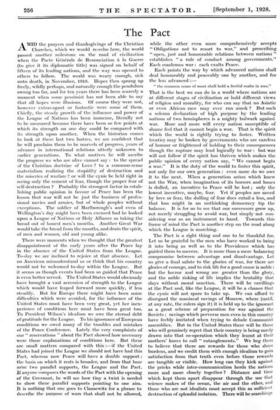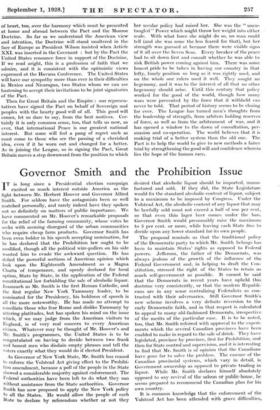The Pact
AMID the prayers and thanksgivings of the Christian Churches, which we would re-echo here, the world passed another milestone on the road of civilization when the Pacte Generale de Renonciation I la Guerre (to give it its diplomatic title) was signed on behalf of fifteen of its leading nations, and the way was opened to others to follow. The world was weary enough, sick unto death, in November, 1918. Hopes then sprang up freely, wildly perhaps, and naturally enough the pendulum swung too far, and for ten years there has been scarcely a moment when some pessimist has not been able to say that all hopes were illusions. Of course they were not, however extravagant or fantastic were some of them. Chiefly, the steady growth of the influence and power of the League of Nations has been immense, literally not to be measured because there have been so few points at which its strength on one day could be compared with its strength upon another. When the historian comes to look at these last two lustres, we are confident that he will proclaim them to be marvels of progress, years of advance in international relations utterly unknown to earlier generations. To what motives he will ascribe the progress we who are alive cannot say : to the spread of the Christian doctrine of Love ? to a common-sense materialism realizing the stupidity of destruction and the miseries of warfare ? or will the cynic be held right in seeing only the cement of fear, though the proper fear of self-destruction ? Probably the strongest factor in estab- lishing public opinion in favour of Peace has been the lesson that war will not be just the business of profes- sional navies and armies, but of whole peoples without exceptions. The soldier of Marlborough's and even of Wellington's day might have been excused had he looked upon a League of Nations or Holy Alliance as taking the bread out of honest men's mouths. Another Great War would take the bread from the mouths, and drain the spirit, of men and women, old and young alike.
There were moments when we thought that the greatest disappointment of the early years after the Peace lay in the absence of the United States from the League. To-day we are inclined to rejoice at that absence. Let no American misunderstand us or think that his country would not be welcomed to-day within the League. But it seems as though events had been so guided that Peace is even better served. The United States would obviously have brought a vast accession of strength to the League which would have leaped forward more quickly, if less steadily. But for Europe there might have been some difficulties which were avoided, for the influence of the United States must have been very great, yet her inex- perience of conditions here must have been great too. To President Wilson's idealism we owe the eternal debt of gratitude for the League. To his ignorance of European conditions we owed many of the troubles and mistakes of the Peace Conference. Lately the very complaints of our " reservations " about the Pact showed how necessary were those explanations of conditions here. But these are small matters compared with this :—if the United States had joined the League we should not have had this Pact, whereas now Peace will have a double support.: the basis on which it rests is broader, and from that base arise two parallel supports, the League and the Pact. 1f anyone compares the words of the Pact with the opening of the Covenant, he will see how tiny a twist is needed to show these parallel supports pointing to one aim. It is nothing that one goes to Clausewitz for a phrase. to describe the purpose of wars that shall. not be allowed, while the other even more comprehensively accepts " Obligations not to resort to war," and prescribing " open, just and honourable relations between nations " establishes " a rule of conduct among governments." Each condemns war : each exalts Peace.
Each points the way by which advanced nations shall deal honourably and peaceably one by another, and for the less advanced :— " the common sense of most shall hold a fretful realm in awe." That is the best we can do in a world where nations are at different stages of civilization or hold different views of religion and morality, for who can say that no Asiatic or even African race may ever run amok ? But such a solemn declaration of high purpose by the leading nations of two hemispheres is a mighty bulwark against war. More and more will every nation susceptible of shame feel that it cannot begin a war. That is the spirit which the world is rightly trying to foster. Written treaties may be broken by governments who are careless of honour or frightened of holding to their consequences though the rupture may lead logically to war : but war will not follow if the spirit has thriven which makes the public opinion of every nation say, " We cannot begin a war." It is the duty of the world to foster this spirit, not only for our own generation : even more do we owe it to the next. When a generation arises which knew not the War, when imagination of its horrors and -losses is dulled, an incentive to Peace will be lost ; only the lowest incentive, maybe, fear. Yet if peoples are saved by love or fear, the dulling of fear does entail a loss, and that loss might in an unthinking democracy tip the balance. It is for us to see that our successors grow up, not merely struggling to avoid war, but simply not con- sidering war as an instrument to hand. Towards this frame of mind the Pact is another step on the road along which the League is marching.
The Pact is a right thing and one to be thankful for. Let us be grateful to the men who have worked to bring it into being as well as to the Providence which has guided them to success. It is more than a mere balancing compromise between advantage and disadvantage. Let us give a final salute to the glories of war, for there are glories of courage, and to risk life for a good cause is noble : but the horror and wrong are greater than the glory, and the noble risking of life implies the brutality that slays without moral sanction. There will be cavillings at the Pact and, like the League, it will be a chance that the cynic will not spare to take up. We can afford to disregard the maniacal ravings of Moscow, where (until, at any rate, the rulers sign it) it is held up to the ignorant as a great scheme of preparation for war against the Soviets ; ravings which perverse men even in this country have feebly imitated when trying to delude Communist assemblies. But in the United States there will be those who will genuinely regret that their country is being surely drawn into that co-operation which they learnt at their mothers' knees to call " entanglements." We beg them to believe that there are rewards for those who share burdens, and we credit them with enough idealism to gain satisfaction from that truth even before those rewards are tangible or visible. How long can they kick against the pricks while inter-communication herds the nations more and more closely together ? Distance and time which kept them apart disappear through the use that science makes of the ocean, the air and the ether, and those who are not idealists must accept this as sufficient destruction of splendid isolation. There will be searching? of heart, too, over the harmony which must be presented at home and abroad between the Pact and the Monroe Doctrine. So far as we understand the American view and intention, the Doctrine will stand unaltered in the face of Europe as President Wilson insisted when Article XXI. was inserted in the Covenant : but by the Pact the United States renounce force in support of the Doctrine. If we read aright, this is a profession of faith that we admire, and it is consistent with the optimistic views expressed at the Havana Conference. The United States will have our sympathy more than ever in their difficulties in Mexico and Nicaragua, two States whom we can see hastening to accept their invitations to be joint signatories of the Pact.
Then for Great Britain and the Empire : our represen- tatives have signed the Pact on behalf of Sovereign and peoples with the hearty good will of all. This good will comes, let us dare to say, from the best motives. Cer- tainly it is only common sense, too, that tells us now, as ever, that international Peace is our greatest national interest. But some will feel a pang of regret such as must come to those who see the passing of a cherished idea, even if it be worn out and changed for a better. As in joining the League, so in signing the Pact, Great Britain moves a step downward from the position to which her secular policy had raised her. She was the " unen- tangled " Power which might throw her weight into either scale. With what force she might do so, no man could tell (and she was none the less feared for that), but her strength was guessed at because there were visible signs of it all over the Seven Seas. Every breaker of the peace had to sit down first and consult whether he was able to risk British power coming against him. There was sonic honest pride to be taken in having our country in that lofty, lonely position so long as it was rightly used, and on the whole our rulers used it well. They sought no hegemony, and it was to the interest of all that no other hegemony should arise. Until this century that policy worked for the good of the world, though how many wars were prevented by the force that it withheld can never be told. That period of history seems to be closing for ever. The League has turned men's thoughts from the leadership of strength, from arbiters holding reserves of force, as well as from the arbitrament of war, and it has opened a window to the dawn of consultation, per- suasion and co-operation. The world believes that it is making trial of a better system than the old one. The Pact is to help the world to give to new methods a fairer trial by strengthening the good will and confidence wherein lies the hope of the human race.































 Previous page
Previous page